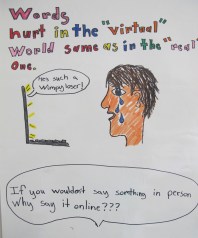
A recent study, about parents, children and the technology rules that families adopt will be a terrific resource for schools and parent groups to share. Most parts of the research paper are fairly easy to read as are two articles, one from the University of Washington and the other from the University of Michigan. The research findings, with an extra focus on children’s expectations, are full of discoveries and observations that schools may want to share, almost word for word, with the parents of digital kids.
Alexis Hiniker and Julie A. Kientz at the University of Washington and Sarita Y. Schoenebeck at the University of Michigan conducted the study about digital life rules that parents make and enforce and the expectations that digital kids and their parents have of one another. A National Science Foundation research grant supported the academic work.

Interestingly, a few years ago I ask my students, after a year of working together, what messages they would give to their parents about the digital world and their parents’ roles. The answers these young people wrote down were so remarkable that I shared the children’s comments in a September 2013 blog post, and I’ve also included some of the posters that my students designed graphic depictions of the digital rules-of-the-road that parents and teachers expect them to uphold.
The kids were insightful and prolific, and the above research confirmed just about everything the children wrote down. It’s always wonderful then a study in the academic world validates my teaching experience.
The researchers surveyed 249 parent and child pairs via an email solicitation, asking a parent to answer questions about family technology rules and family behavior expectations. Each adult chose one child in the family, between the ages of 10 and 17, to take the student survey. All participants were asked to describe the rules, explain how effective the rules were from the parent and child perspectives, and answer questions about how easy or hard it was to follow the family rules.

Data from the adult surveys indicated to the researchers two types of the 481 unique parental rules reported — those that prohibited use (called activity constraints), which were relatively easy for kids to follow and rules that allowed children to use various types of technology but with limitations and specific expectations (called context constraints). The possible constraints included things such as how long a mobile device might be used or when certain online activities could or could not be used.
Researchers found that while parents set up most of these rules, they often had difficulty following the rules themselves. A useful section of the study’s report organized and coded the parental rules into categories and also identified a correlation between children’s input into the rule-making and ease of following the rules that they had helped create.

Children responded to the survey with some definite opinions, especially about how much “sharenting” parents should do online about their kids. Many children, and this was evident whenever I worked with students in fourth grade or older, begin to resent the things that parents post about them on social media, but they are not adept at telling their parents to stop or at least slow down the posting.
Other issues that children commented on included using digital devices while driving and the tendency of their parents to use devices when they should be paying attention to their kids in situations such as athletic games and school events. Children in the survey and in my informal school activities sometimes perceive adults as hypocritical when parents do not follow their own rules.
Digital health and wellness is a goal for everyone — not just in kids’ lives — and rules made and expectations for time spent away from technology should be observed by all members of a family.

I have to admit I’m guilty of burying myself in my phone and computer, like now. But, I can’t believe parents in restaurants ignoring their kids, and looking at their phones. My own kids do it a little bit with their own kid at their house. When I go to the health club at night, the young people in the sauna each of their phones on, and even in the whirlpool.